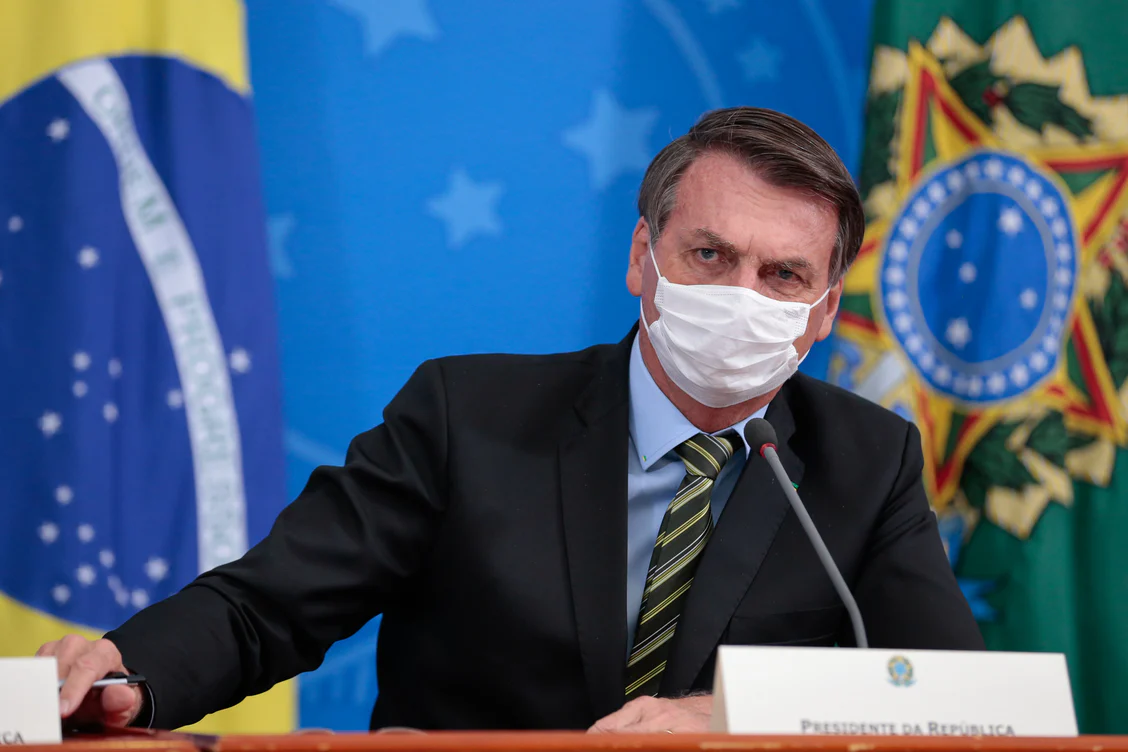COVID-19 and The limits of Bolsonarism
Brazilian President, Jair Bolsonaro, has continuously underplayed the coronavirus crisis, calling it nothing but 'sniffles' but as the death rises, Matheus Lock explains how and why the pandemic reveals the flaws within his leadership that may prove fatal.

Covid-19 exposes many of the limits of our forms of social organization. One of its main effects is to show the limit of the political logic of contemporary right-wing populism. Worldwide we have witnessed a paradigmatic shift in the negationist position of right-wing leaders such as Trump, Boris Johnson, Narendra Modi, Orbán and Putin, to positions of apparent sobriety to deal with the widespread Coronavirus crisis. This change was a pragmatic obligation of realpolitik in which politicians saw the possibility of death by the thousands an abysmal loss of political capital. In Brazil, however, the effects of Covid-19 were not able to force a turn in Bolsonaro's approach to the crisis but, rather, has exposed the limits of his political logic.
It has long been argued that Bolsonaro established himself as an outsider of the political system despite having a long career on the almost forgotten margins of the Brazilian congress. During the political chaos that ensued in the post-impeachment years, Bolsonaro managed to gather fears, hopes, and hatred by balancing a series of issues dear to various sectors of the Brazilian society. These include security, family, religion, nationalism, market, moral rectitude, and anti-leftism. Added to these themes are other elements common to the contemporary extreme right, such as the use of conspiracy theories as a backdrop for their discursive construction of reality. This has created an anti-systemic stance in the face of the invisible hand of a liberal elite that conspires for world domination, and the anti-intellectualism and anti-science creed that rejects scientific data and research, placing them as part of the plot to end capitalism, family, religion, and even white Western civilization.
Through the articulation of these issues, Bolsonaro managed to become their representative and to establish a new libidinal bond where he stands as the strong and protective leader, a kind of Oedipal father. He was elevated to the status of a “messiah” or “legend” that would save the Fatherland, concentrating in his persona both the discontent with the political system as well as the desire to repress insecurities, castrate social justice and restore traditional values. Bolsonaro has become one of the main captains of the politics of resentment. As Ernesto Laclau would say, his populist discourse generated a process of collective identification, where, on the one hand, his followers project their particularities on him (beliefs, anxieties, fears, hopes), and, on the other, it transforms Bolsonaro's personality because it necessarily implies the obliteration of some of his most despicable particularities (racism, xenophobia, misogyny and so on).
However, the line that ties as well as propels Bolsonarism as populist logic is antagonism. It is through antagonism that Bolsonaro managed to institute a strong external frontier between him and his enemies and internal distinctions between groups of supporters, delimiting their differences, similarities, objectives, demands, and targets. It is as a movement of struggle that antagonism becomes an identification process able to mobilize affects and desires to the point of creating an almost indestructible link between Bolsonaro and his most loyal followers. It is the antagonism that gives the sense of union through the satisfaction of experiencing communion in the violation of the enemy, and through the pleasure attached to the risk of its own demise in a lost battle. The bond is in the desire and pleasure of death, in the drive towards death.
This populist logic worked very well during the 2018 presidential campaign. Bolsonaro was elected with about 57 million votes, a comfortable majority in both houses and without sufficiently articulated opposition. And as a result, Bolsonaro had the ideal context to implement any policy and project for social transformation. But it was clear that his populism had no proposal for systemic transformation or even improvements in governance, nor a project for power consolidation but only the objective of establishing a new ideological hegemony in Brazil disguised as non-ideological moral superiority.
Bolsonaro outsourced the government to ministers like Sérgio Moro (Minister of Justice and Public Security) and Paulo Guedes (Minister of the Economy), as well as to the army, keeping to himself only what his belligerent populist logic allows: the constant antagonism with imaginary enemies and the mobilization of affects for the creation of a Suicidal State that would face the Covid-19 pandemic with open arms and without any protection, potentially leading thousands to the grave.[1] In the first months of his tenure, Bolsonaro, having exhausted his enemies, turned against those hitherto considered allies, including those from the army, such as the vice-president, Hamilton Mourão, and his former Minister-Secretary of Government, Carlos Alberto Santos Cruz.
Now, more than a year in the presidency, Bolsonaro has managed to deteriorate almost all the support he had, losing the leadership both to his ministers and to the congress, responsible for sewing the approval of thorny political reforms. One of the latest casualties of his antagonistic politics was one of his most important ministers, Sérgio Moro, who has just resigned from office, weakening further the government. In a way, this logic of antagonism exempts Bolsonaro from making tough decisions that could damage the core of his most loyal ideological supporters, thus placing all responsibility on the lap of his enemies or possible competitors in the next general election, while allowing him to claim he is the victim of collusion that prevents him from governing.
When the pandemic landed in Brazil, Bolsonaro did the only thing possible within his scope of action; he went to the attack, dismissing the virus as a “fantasy” and arguing that it would not stop the country. This posture undoubtedly takes into account the realpolitik, because if the economy goes awry, one of its main fiduciaries in the 2018 election, the market, backs off. Then, Bolsonaro decided not only to contradict the WHO guidelines and his health minister but to antagonize scientists and specialists, spread fake news, conspiracy theories and medicines with unproven efficacy, aka, chloroquine.
From Trump to Amlo, several other leaders adopted a similar stance at the beginning of the crisis but changed when Covid-19 proved to be much more dangerous than expected. And, instead of embracing the Machiavellian manual for unscrupulous tyrants once and for all, taking the lead in fighting the pandemic and venting his totalitarian instincts, like Orbán, Bolsonaro's negationist stance turned him into the opposite of a president, into an anti-president destabilizing the country and creating chaos within his own administration. In the first months of his tenure, Bolsonaro, having exhausted his enemies, turned against those hitherto considered allies, including those from the army, such as the vice-president, Hamilton Mourão, and his former Minister-Secretary of Government, Carlos Alberto Santos Cruz.
This institutional belligerence put Bolsonaro inevitably on a collision course with his health minister, whom he soon fired, expanding the loss of the remaining support he had in the congress, plus creating tension with parts of the army, and damaging his political capital with sections of the population. His anti-president stance and mismanagement of the Covid-19 outbreak have not only increased his political isolation but also brought to the fore of the political landscape speculations about alternatives for his departure from the presidency. For, as Wright Mills would say in his The Power Elite,[2] a regime that loses support from the majority of the population can only remain in power through the articulation and support of the elite’s triumvirate from the economy, political and armed forces.
In Bolsonaro's case, everything seems to be crumbling with the winds of his intolerance. From impeachment to the dislocation of power from Bolsonaro to the Chief of Staff, General Walter Braga Neto, who would act as the country’s “operational president”, there are several alternatives under consideration. Another alternative might be his resignation, but it seems unlikely because to resign would mean admitting that his failure and would destroy the mythology of the messiah. Only by fighting to remain in power the legend becomes perennial and maintains its ability to mobilize affects.
And this is exactly where the Coronavirus exposes the limits of Bolsonarism. Before the outbreak, Bolsonaro used his logic of populist antagonism to test the limits of the forces at play in every decision, moving forward or backward according to the noises coming from the digital networks or his allies. Using a current metaphor in some political analyzes in Brazil, it is as if Bolsonaro is constantly raising his bets on the country’s political poker, paying off to see the reactions and to calculate possible actions.[3]
However, with the increase in his political isolation due to Covid-19, such a strategy is not holding water. Cornered and without guarantors for the maintenance of his government, Bolsonaro self-fulfilled his own prophecy that everyone wanted his head, and now he is raising the bet on a kind of irreversible all-in that can only be sustained as long as the chaos generated by the pandemic continues.
Contrary to the logic of politics itself, Bolsonaro raises the stakes as a survival strategy, making each antagonism as a way of extending the limits of Bolsonarism as a political identity. This identity is not based necessarily on the demands it articulates, but on the movement of belligerent antagonism that can only assert itself as such insofar as enemies exist. In other words, the survival of the legend of the messiah occurs only in the self-realization of its essence in the prophecy of confronting the Big Other.
This is why raising the bet is the very reason for Bolsonarism’s existence as a political logic. But it was only with the Coronavirus that it became clear to the world that Bolsonaro uses the logic of poker to play chess. His bluff was deflated, and his knights, bishops, and rooks are silently changing sides. Bolsonaro’s all-in smells like a suicidal checkmate.
If the limits of Bolsonaro's extreme right-wing populist logic are exposed and proved insufficient to govern at any time, let alone in times of crisis, the outcome of this last round is still open. If the effects of the Corona are less harmful to life and more to the economy, Bolsonaro will use the old strategy of the “I told you so” and will be able to capitalize politically on the ruins of the economy and the people’s misery, mobilize his entourage and lead to the final realization of the Suicidal Republic.
If the Coronavirus death toll in the country is what experts predict, Bolsonaro will become invariably isolated, becoming either a moving target for the impeachment snipers or a presidential scarecrow, whose government will be led by a mix between an informal Parliamentary system and constitutional militarism. It seems that few movements remain in this complex political chess. It remains to be seen whether the seemingly inevitable self-destruction of Bolsonarism’s logic will drag everyone to the abyss or will lead us to a self-coup backed by the army, or else to know what kind of checkmate will put an end to his presidency.
Matheus Lock is a PhD in political science based in Brazil whose work focuses on the intersection between populism, social movements and digital technology. He is the author of Comunicações transversais: o preconceito digital e os efeitos na opinião pública (Cross-cutting communications: digital prejudice and the effects on public opinion).
[book-strip index="1" style="display"][1] Vladimir Safatle, “Bem Vindo Ao Estado Suicidário,” N-1 Edições (São Paulo, 2020), https://n-1edicoes.org/004.
[2] C. Wright Mills, The Power Elite (New York: Oxford University Press, 2000).
[3] Fábio Bittes Terra, Cláudio Couto, and João Villaverde, “Bolsonaro e a Política Do ‘All in’: Estratégia de Confronto,” Nexo, 2020.



